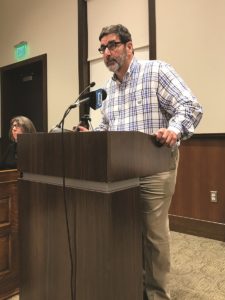PLYMOUTH — In a letter sent to Holtec Decommissioning International, the U.S. Environmental Protection Agency has warned decision makers at the company they could face fines and even jail time if they proceed with a radioactive wastewater release. That’s because the company’s current permit does not allow it.
At the same time, the Association to Preserve Cape Cod has hired a Boston law firm to take preemptive action, such as a court injunction, to stop any wastewater discharge into Cape Cod Bay.
These actions came after Holtec made clear at the Nov. 28 meeting of the Nuclear Decommissioning Citizens Advisory Panel that it will not alter its plan to release up to 1.1 million gallons of radioactive wastewater from the plant’s spent fuel pool and other systems into the bay.

Previously, the company had pressed forward despite opposition from environmental groups, members of the fishing and tourism industries, and legislators at both state and federal levels. This time, Holtec indicated it might also ignore regulators.
According to Ken Moraff, water division director of EPA’s northeast office, the company’s current discharge permit would prohibit the planned release. Holtec officials have said the company intends to apply for a permit amendment but has not yet done so. Federal and state reviews of such an application could take as long as a year, according to EPA spokesperson David Deegan.
At the Nov. 28 meeting, Holtec Senior Compliance Manager David Noyes would not promise the company would wait for a revised permit. Asked if there would be no discharge until the resolution of the discharge permit issue, Noyes answered, “I can’t say that.”
A member of the citizens’ panel later asked if the company would provide advance notice of a discharge, to which Noyes responded, “I’ll have to get back to you.”
A few days after that meeting, James Chow, deputy director of the EPA’s division of enforcement and compliance, fired off a letter to Holtec’s president Kelly Trice restating a message the agency had delivered a few times before: the company’s current permit prohibits the discharge. A copy of Chow’s letter was obtained by the Independent.
Such discharges are in violation of the Clean Water Act, Chow wrote, and could result in fines, jail time, or both for the company’s decision makers.
Chow also ordered Holtec to give 90 days notice of any release of wastewater to EPA’s enforcement division. The required notice would give the EPA adequate time to ensure compliance, Chow wrote.
Also, according to the letter, going forward the federal agency will require that responses to its requests for information be accompanied by signed certification by the Holtec employee compiling the information that it is “true, accurate, and complete.” The certification would also have to confirm that the employee is aware “there are significant penalties for submitting false information, including the possibility of fines and imprisonment.”

Closer to home, Andrew Gottlieb, a new member of the citizens advisory panel and the executive director of the Association to Preserve Cape Cod, announced last week that his organization has retained the Boston firm of Sugarman, Rogers, Barshak & Cohen, P.C. to help with the effort to block any release of Pilgrim’s wastewater into the bay.
Gottlieb said APCC is “in the process of evaluating our legal options, including seeking a preemptive injunction.” It’s the organization’s role, he added, “to hold people accountable to the letter of the law.
“With the injunction,” Gottlieb added, “we are particularly interested in raising the stakes on penalties so they can’t view this as simply doing something illegal, paying the fine, and being ahead of the game financially, versus compliance.”
The strategy, he said, is to get Holtec leadership to “think real long and hard about whether they want to pursue something that’s illegal.”



